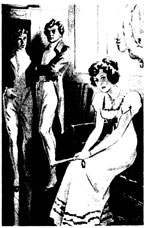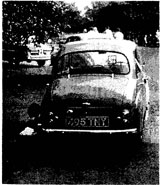Blow Out the Moon (7 page)

“But I
do
miss wearing blue jeans. I HATE having to wear skirts and dresses all the time.”
“I know — you’ve said that — but imagine if someone you knew had moved to Japan, and you wanted to know what Japan was like, and the letter kept saying, ‘And I can’t wear my red sneakers.’ ”
Henry would understand how I felt — he always got it. And he never thought I was boring. At least — he never had before. But that didn’t mean he never would. I’d never been unpopular before, either, and now I was. I read the letter to myself.
“I guess it is kind of boring,” I said. “I’ll write it over.”
“But not now — it’s time for dinner.”
The dining room had one big window that looked out onto a small square of gray cement and dark walls. We had dinner at a long oval table that was really too big for our family. Our father sat at one end (it was so dark, and the table was so long, that it was hard to see him). Our mother sat at the other end, with me next to her, Emmy between me and my father, and Willy and Bubby across from us.
There was a chandelier that didn’t give out much light over the table, and a tiny fireplace behind my father. During dinner, my parents talked to each other as usual. The only interesting part was when my father was telling her about “rhyming slang.” He said that someone named Norman used it a lot and sometimes he, Daddy, didn’t get it.
“Today he threw something on my desk and —” Daddy said the next part imitating the man’s voice and accent and expression — Daddy’s really good at imitating people, “—‘’ere, ’av a butcher’s at this.’ ”
“What did that mean?” I said.
“ ‘Here, have a look at this.’ ‘Butcher’s hook’ means ‘look.’ ”
“Is it code?” I said.
“Slang,” Daddy said. “In rhyming slang, instead of saying a word, they say something that rhymes with it: ‘wife’ is ‘trouble and strife.’ ” (He looked at my mother and laughed.) “But when they only say the part that doesn’t rhyme, it can be hard to understand.”
“What are some other ones?” I said.
My father made a face — he makes faces a lot when he talks — and said, “ ‘Septic tank’ is ‘Yank’ — short for Yankee, an American.”
“And ‘apples and pears’ means stairs,” my mother said.
“And ‘Mable, Mable’ could be table!” I said excitedly.
“Finish your dinner and don’t talk so much,” he said.
After a while I stopped listening. I thought about England, and how everything seemed to come out of a rhyme or a story — “Yank” was probably from the song “Yankee Doodle.” (So they DID know about the Revolution! That proved it!)
At dessert, my father asked if any of us had learned anything interesting. I answered first.
The English mode up the words to “Yankee Doodle” and sang it to insult the American soldiers in the Revolution: “doodle” meant “fool.”
Yankee Doodle went to town, riding on a pony, Stuck a feather in his hat and called it macaroni. Yankee Doodle, keep it up! Yankee Doodle, dandy! Mind the music and the step and with the girls be handy!
But the Americans sang their own words right back at the redcoats:
Yankee Doodle is the tune Americans delight in: Twill do to whistle, sing, or play and just the thing for fightin’.
Yankee Doodle, keep it up! Yankee Doodle, dandy! Mind the music and the step and with the girls be handy!
“I learned that they used to make children pull carts in coal mines and clean the soot out of chimneys, because the tunnels and chimneys were too small for grown-ups to crawl into,” I said. There was a picture of a chimney sweep in our history book — he looked about five! They’re not very nice to children in this country, are they?”
“They have laws against that sort of thing now,” my mother said.
“But it would never have happened at all in America, because we had the Revolution.”
My father laughed and asked how I knew that.
“Well, I don’t KNOW — but I bet they thought it was better for chimneys to be dirty than for kids to be chimney sweeps. Or maybe they just had bigger chimneys! Our fireplace in America was big.”
“Was that because of the Revolution, too?” he said in a teasing voice.
“It’s not funny!” I said — saying anything else would just make him laugh more. He doesn’t really understand about the Revolution.
Emmy said, “We learned this: ‘Nouns are just the names of things, Like birds and beasts and cats and kings …’ ”
I forget the rest — she chanted it in the singsong way they did at school, imitating Mrs. Reed keeping time with her ruler, and Willy joined in. We all laughed, and then my mother started to clear the table, and we went to our room.
I read in bed until my mother came in to get the others ready for bed and read a story. While she was reading, I took Henry’s last letter out of the white box and held it in my hand, and I thought about what I could say in my letter that wouldn’t be boring. I decided to tell about the Underground, and the red buses, and the soldiers in their red uniforms (
real
redcoats!) guarding the palaces. Henry was interested in soldiers. I’d tell him how stalwart they looked, no matter what happened or what anyone said or did; I was interested in that, too.
The soldiers guarding Buckingham Palace always walked back and forth, back and forth, just outside the fence, and no matter what anyone watching them said or did, they never changed their expressions or said a word back. Except once, my mother told us (she read about it in the paper), an American tourist — a grown-up — walked next to one of these soldiers and shouted insults at him for over two hours, trying to make him talk or look at her. But he wouldn’t — until finally, after more than two hours, he kicked her in the shin. After that the soldiers marched inside the palace fence.
Another Good Thing
I wasn’t very stalwart the next morning. The day started with one of those happy dreams I have
just
before it’s time to get up, only this one was very real.
In the dream, it was a sunny fall afternoon in Pleasantville. Kenny and Peg and Pat and Emmy and I were in our front yard, hulahooping under the trees. The air was thin and the light was pale. It was hot and I could feel the sun on my face and dead leaves scratching my socks; the leaves above me blazed yellow and orange and red; I could see bright blue sky and sunlight shining through them all, especially the yellow ones.
When I first woke up I thought I was at home in America, and I was happy — until I remembered.
I was in London.
I was in London, in the basement room with the black bars on the windows. In London, where when it wasn’t raining it was gray — gray all day and dark by the time I got out of school. London. I felt heavy and gray, like the buildings and the sidewalks and the sky and the air.
I had the dream every morning. It was always exactly the same, and I always woke up happy from it, until I remembered where I really was.
I was in London. One morning I looked up at the heavy gray sky (what you could see of it through all the black bars) and almost started to cry.
I never cry
. I didn’t even cry when I slit my knee open playing baseball and had to have thirteen stitches! I had to do something.
There was a high bookshelf in the hallway outside our room. I looked up at the books and then carried a chair in from the dining room and stood on it to choose. The paint was peeling, and the heat pipes near the ceiling were dusty and so were the books. There were books for children and grownups; I took down some of each and started reading.
The one I read first was about five sisters whose mother really wanted them to get married, and it was called
Pride and Prejudice
. One of the sisters (named Lizzy — her real name was Elizabeth, like mine) was lively and charming; she was her father’s favorite. She had very arched eyebrows and the question marks in the book were arched, too, and the author said Lizzy talked “archly” — it all fit together, and I liked that. The mother was very childish and silly (she was so ridiculous that she made me laugh, and I liked that, too) and the father made jokes about everything, and because Lizzy was smarter than all her sisters he thought she was great; all the men liked her.

This is from the first book I read.

This is what I always did on sight-seeing trips when we got to the sight my parents wanted to see.
I loved that book. I brought it everywhere with me. I brought it to school and read it there, and on the Underground, and at home I read without stopping from the time I got home from school until dinner, and then from dinner until I went to sleep.
On weekends, when my parents took us on sight-seeing trips, I’d stay in the car, reading it. If my father made me get out of the car, I’d sit down next to it and go on reading.

If they made me get out of the car, this is what I did.
As soon as I finished one book, I started another. After a while I read mostly books about girls going to boarding school: There were lots of those books in the apartment, and I loved them.
The girls in those books slept in a room with other girls their own age and ate together and had lessons together. Usually in them a new girl came, and the other girls made fun of her and teased her and didn’t like her at first — and then she did something heroic and everyone liked her a lot.
Or sometimes the girls had adventures together: The adventure usually started at night with someone putting on her dressing gown and getting a torch (that’s what they call a flashlight). I was surprised that they always had torches with batteries and bulbs that worked; each time they’d get the torch I’d wonder if this time the battery or bulb would be dead, but it never was.
And there was always a scene of a midnight feast: In the middle of the night, they would get up, put on their dressing gowns, light their torches, and spread food on a blanket.
So that was another good thing, reading. I read like that until one Saturday Jill took us to a toy store.
The Dolls
It was more like a room in an old-fashioned house than a toy store.
The best things were in a long wooden case with a glass top and glass front. Inside were dolls — not big dolls, but dollhouse dolls. I never liked dolls in America: Their faces didn’t look real at all.

